Related Research Articles
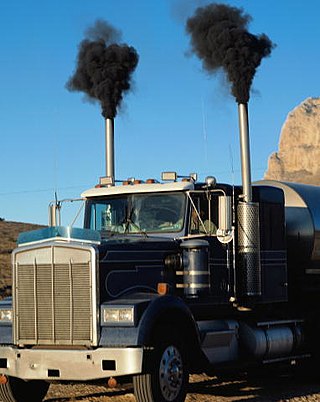
Exhaust gas or flue gas is emitted as a result of the combustion of fuels such as natural gas, gasoline (petrol), diesel fuel, fuel oil, biodiesel blends, or coal. According to the type of engine, it is discharged into the atmosphere through an exhaust pipe, flue gas stack, or propelling nozzle. It often disperses downwind in a pattern called an exhaust plume.
The United Kingdom's Climate Change Programme was launched in November 2000 by the British government in response to its commitment agreed at the 1992 United Nations Conference on Environment and Development (UNCED). The 2000 programme was updated in March 2006 following a review launched in September 2004.

The hydrogen economy is an umbrella term for the roles hydrogen can play alongside low-carbon electricity to reduce emissions of greenhouse gases. The aim is to reduce emissions where cheaper and more energy-efficient clean solutions are not available. In this context, hydrogen economy encompasses the production of hydrogen and the use of hydrogen in ways that contribute to phasing-out fossil fuels and limiting climate change.

AirCare was an initiative started in 1992 to improve air quality in British Columbia, Canada through the systematic testing of road vehicles in order to reduce their emissions. Light-duty vehicles were suggested to be the biggest contributors to air pollutants that form smog and a small percentage of vehicles were contributing a large percentage of the pollutants. AirCare ran for 22 years and was cancelled on December 31, 2014. AirCare was cancelled due to the fact that new vehicles were continuously becoming more eco-friendly, and the percentage of old cars on the road was decreasing.
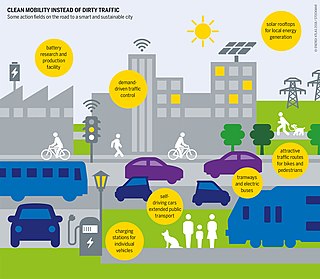
Sustainable transport refers to ways of transportation that are sustainable in terms of their social and environmental impacts. Components for evaluating sustainability include the particular vehicles used for road, water or air transport; the source of energy; and the infrastructure used to accommodate the transport. Transport operations and logistics as well as transit-oriented development are also involved in evaluation. Transportation sustainability is largely being measured by transportation system effectiveness and efficiency as well as the environmental and climate impacts of the system. Transport systems have significant impacts on the environment, accounting for between 20% and 25% of world energy consumption and carbon dioxide emissions. The majority of the emissions, almost 97%, came from direct burning of fossil fuels. In 2019, about 95% of the fuel came from fossil sources. The main source of greenhouse gas emissions in the European Union is transportation. In 2019 it contributes to about 31% of global emissions and 24% of emissions in the EU. In addition, up to the COVID-19 pandemic, emissions have only increased in this one sector. Greenhouse gas emissions from transport are increasing at a faster rate than any other energy using sector. Road transport is also a major contributor to local air pollution and smog.

A green vehicle, clean vehicle, eco-friendly vehicle or environmentally friendly vehicle is a road motor vehicle that produces less harmful impacts to the environment than comparable conventional internal combustion engine vehicles running on gasoline or diesel, or one that uses certain alternative fuels. Presently, in some countries the term is used for any vehicle complying or surpassing the more stringent European emission standards, or California's zero-emissions vehicle standards, or the low-carbon fuel standards enacted in several countries.
Te Manatū WakaMinistry of Transport is the public service department of New Zealand charged with advising the New Zealand Government on transport policy. The Ministry works closely with other government transport partners, including the New Zealand Transport Agency (NZTA) to advance their strategic objectives.
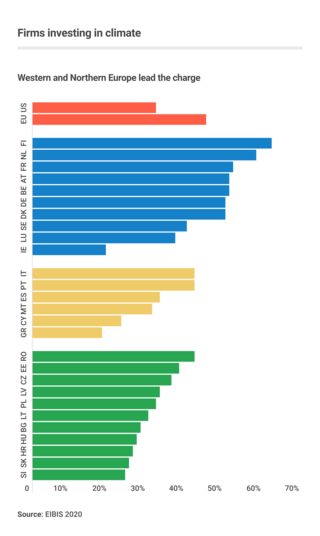
Business action on climate change is a topic which since 2000 includes a range of activities relating to climate change, and to influencing political decisions on climate change-related regulation, such as the Kyoto Protocol. Major multinationals have played and to some extent continue to play a significant role in the politics of climate change, especially in the United States, through lobbying of government and funding of climate change deniers. Business also plays a key role in the mitigation of climate change, through decisions to invest in researching and implementing new energy technologies and energy efficiency measures.
Various energy conservation measures are taken in the United Kingdom.
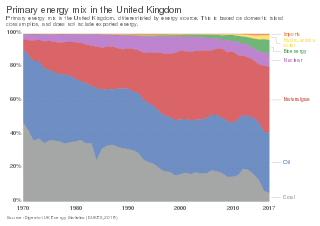
The energy policy of the United Kingdom refers to the United Kingdom's efforts towards reducing energy intensity, reducing energy poverty, and maintaining energy supply reliability. The United Kingdom has had success in this, though energy intensity remains high. There is an ambitious goal to reduce carbon dioxide emissions in future years, but it is unclear whether the programmes in place are sufficient to achieve this objective. Regarding energy self-sufficiency, UK policy does not address this issue, other than to concede historic energy security is currently ceasing to exist.

A low-carbon economy (LCE) is an economy which absorbs as much greenhouse gas as it emits. Greenhouse gas (GHG) emissions due to human activity are the dominant cause of observed climate change since the mid-20th century. There are many proven approaches for moving to a low-carbon economy, such as encouraging renewable energy transition, energy conservation, electrification of transportation, and carbon capture and storage. An example are zero-carbon cities.
Energy Saving Trust is a British organization devoted to promoting energy efficiency, energy conservation, and the sustainable use of energy, thereby reducing carbon dioxide emissions and helping to prevent man-made climate change. It was founded in the United Kingdom as a government-sponsored initiative in 1992, following the global Earth Summit.
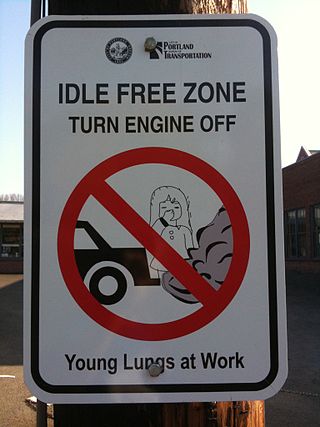
Idle reduction describes technologies and practices that minimize the amount of time drivers idle their engines. Avoiding idling time has a multitude of benefits including: savings in fuel and maintenance costs, extending vehicle life, and reducing damaging emissions. An idling engine consumes only enough power to keep itself and its accessories running, therefore, producing no usable power to the drive train.

The Clean Cities Coalition Network is a coordinated group of nearly 100 coalitions in the United States working in communities across the country to advance affordable, domestic transportation fuels, energy-efficient mobility systems, and other fuel-saving technologies and practices. The U.S. Department of Energy’s Office of Energy Efficiency and Renewable Energy’s Vehicle Technologies Office facilitates national coordination of the coalitions through its Technology Integration Program. The Network consists of 79 coalitions that work with more than 15,000 local stakeholders that have helped shift nearly 10 billion gasoline gallon equivalents of conventional fuel to alternative fuels or energy efficiency improvements, put more than 1.1 million alternative fuel vehicles on the road, and contributed to the expansion of alternative fueling station infrastructure since 1993. As of early 2020, there were more than 29,000 fueling stations nationwide that provide at least one of the following alternative fuels: ethanol (E85), biodiesel, compressed natural gas, electric, hydrogen, liquefied natural gas, renewable natural gas, or propane.
The Renewable Fuels Agency (RFA) was a UK Government non-departmental public body, created by the Department for Transport to implement the Renewable Transport Fuel Obligation or RTFO. The Agency ceased to exist at midnight on 31 March 2011 The Renewable Fuels Agency (RFA) was the UK's independent sustainable fuels regulator. The agency awards Renewable Transport Fuel Certificates (RTFCs) to suppliers of biofuels in the UK, ensures companies meet their annual obligations and runs the RTFO's carbon and sustainability reporting system.

A low-carbon fuel standard (LCFS) is an emissions trading rule designed to reduce the average carbon intensity of transportation fuels in a given jurisdiction, as compared to conventional petroleum fuels, such as gasoline and diesel. The most common methods for reducing transportation carbon emissions are supplying electricity to electric vehicles, supplying hydrogen fuel to fuel cell vehicles and blending biofuels, such as ethanol, biodiesel, renewable diesel, and renewable natural gas into fossil fuels. The main purpose of a low-carbon fuel standard is to decrease carbon dioxide emissions associated with vehicles powered by various types of internal combustion engines while also considering the entire life cycle, in order to reduce the carbon footprint of transportation.

The environmental effects of transport are significant because transport is a major user of energy, and burns most of the world's petroleum. This creates air pollution, including nitrous oxides and particulates, and is a significant contributor to global warming through emission of carbon dioxide. Within the transport sector, road transport is the largest contributor to global warming.

In 2021, net greenhouse gas (GHG) emissions in the United Kingdom (UK) were 427 million tonnes (Mt) carbon dioxide equivalent, 80% of which was carbon dioxide itself. Emissions increased by 5% in 2021 with the easing of COVID-19 restrictions, primarily due to the extra road transport. The UK has over time emitted about 3% of the world total human caused CO2, with a current rate under 1%, although the population is less than 1%.
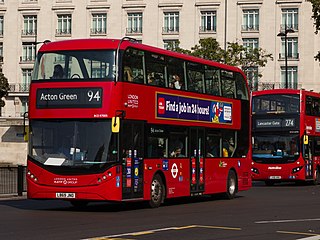
There are 3,835 hybrid buses, 950 battery electric buses, and 20 hydrogen fuel cell buses operating in London, as of March 2023, out of a total bus fleet of 8,643 – this is around 56% of the bus fleet.

Cenex, the Low Carbon and Fuel Cells Centre of Excellence, is an independent non-profit research and consultancy that helps private and public sector organisations devise ULEV strategies. Founded in 2005, Cenex is headquartered in Loughborough, United Kingdom.
References
- ↑ "House of Commons Hansard Written Ministerial Statements for 15 Oct 2003 (pt 2)".
- ↑ Reducing carbon emissions from transport: ninth report of Session 2005-06. London: Stationery Office. 2006. p. 31. ISBN 0215030427.
- ↑ "Powering future vehicles strategy" (PDF). www.zemo.org.uk. Retrieved 2024-06-21.
- ↑ "2010 to 2015 government policy: greenhouse gas emissions".
- ↑ "Energy Efficiency Policies & Measures Database, Graph and Summary Table" (PDF).
- ↑ Unknown [ permanent dead link ]
- ↑ "Investing in the low carbon journey" (PDF). www.zemo.org.uk.
- ↑ "House of Commons - Environmental Audit - Minutes of Evidence".
- ↑ "LowCVP: Shortlist announced for 2014 Low Carbon Champions Awards!". Automotive World. 3 September 2014. Retrieved 30 January 2016.